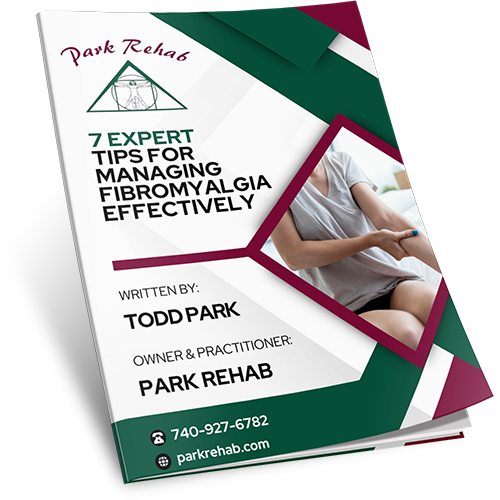Fibromyalgia
At Park Rehab, we focus on addressing the neuromuscular imbalances that contribute to fibromyalgia, with the goal of restoring balance to the nervous system and helping patients regain independence in their daily activities.
What Is Fibromyalgia?
Fibromyalgia is a chronic condition that causes widespread pain and tenderness throughout the body. It is often characterized by specific areas on the body known as tender points—17 distinct areas located on both sides of the body where pain is most commonly felt. These tender points are sensitive to pressure and are a hallmark of the condition.
The exact cause of fibromyalgia is not fully understood, but it is believed to result from an imbalance in the nervous system, where the brain processes pain signals differently than it should. This leads to heightened sensitivity to pain, fatigue, and various other symptoms. Despite the chronic pain and discomfort it causes, fibromyalgia does not cause damage to muscles, joints, or organs, though the symptoms can significantly affect a person’s daily life.
At Park Rehab, we focus on addressing the neuromuscular imbalances that contribute to fibromyalgia, with the goal of restoring balance to the nervous system and helping patients regain independence in their daily activities.
What are the symptoms of Fibromyalgia?
Fibromyalgia can present a variety of symptoms that can be overwhelming and debilitating for those who suffer from it. The primary symptoms include:
- Chronic Pain: Widespread pain across the body, especially in the tender points, is the most common symptom. This pain can feel like a constant dull ache or sharp, shooting pains.
- Fatigue: Many people with fibromyalgia experience extreme fatigue that can make it difficult to carry out daily activities or feel refreshed even after a full night’s sleep.
- Sleep Disturbances: People with fibromyalgia often have trouble getting restful sleep, which can worsen other symptoms like fatigue and pain.
- Headaches: Tension headaches or migraines are common for those with fibromyalgia, often occurring alongside other symptoms.
- Digestive Problems: Some people with fibromyalgia experience irritable bowel syndrome (IBS), which causes bloating, constipation, and diarrhoea.
Because fibromyalgia is such a complex condition with symptoms that overlap with other disorders, it can often be misdiagnosed or overlooked. Individuals with fibromyalgia may have tried a variety of treatments, such as over-the-counter medications, cold compresses, or rest, but often these methods provide limited relief or no improvement at all.
What Is Our Approach To Treating Fibromyalgia?
At Park Rehab, we take a holistic, patient-centered approach to treating fibromyalgia. Instead of simply masking the symptoms, we focus on restoring balance to the nervous system and addressing the underlying neuromuscular imbalances that are contributing to the pain and discomfort.
Our treatment approach includes:
- Neuromuscular Rebalancing: We identify and address any imbalances in the nervous system and musculoskeletal system that may be contributing to pain. By improving these imbalances, we help reduce the intensity of symptoms and enhance the body’s ability to function properly.
- Movement Restoration: We work with patients to improve their movement patterns and restore function, allowing them to return to daily activities like exercising, gardening, and engaging in physical fitness.
- Therapeutic Techniques: We use a combination of hands-on therapies to relieve muscle tension and reduce pain. These treatments focus on releasing tight muscles, improving circulation, and reducing stress on the nervous system.
- Exercise Programs: Gentle exercise regimens, tailored to each patient’s needs, are implemented to improve strength, flexibility, and endurance. These exercises are designed to avoid exacerbating pain while promoting overall well-being.
- Education & Empowerment: We provide patients with the tools, strategies, and knowledge they need to manage their fibromyalgia. This includes learning how to manage pain, improve sleep, and incorporate stress-reduction techniques into their daily routine.
Our goal is to help fibromyalgia sufferers regain their independence, so they can return to the activities they love, such as working out, gardening, or simply performing their daily routines without pain. We’re proud to have had great success in treating fibromyalgia and improving our patients’ quality of life.
Download Our free Report
If you’ve been struggling with fibromyalgia and are ready to find a solution, download our free guide, which contains tips and tricks to help alleviate pain at home as well as information on how to achieve lasting relief.

